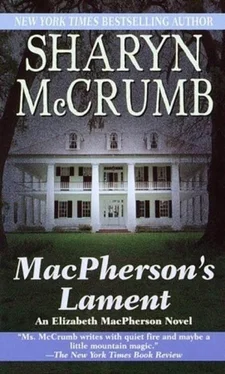Sharyn McCrumb - MacPherson's Lament
Здесь есть возможность читать онлайн «Sharyn McCrumb - MacPherson's Lament» весь текст электронной книги совершенно бесплатно (целиком полную версию без сокращений). В некоторых случаях можно слушать аудио, скачать через торрент в формате fb2 и присутствует краткое содержание. Жанр: Детектив, на английском языке. Описание произведения, (предисловие) а так же отзывы посетителей доступны на портале библиотеки ЛибКат.
- Название:MacPherson's Lament
- Автор:
- Жанр:
- Год:неизвестен
- ISBN:нет данных
- Рейтинг книги:3 / 5. Голосов: 1
-
Избранное:Добавить в избранное
- Отзывы:
-
Ваша оценка:
- 60
- 1
- 2
- 3
- 4
- 5
MacPherson's Lament: краткое содержание, описание и аннотация
Предлагаем к чтению аннотацию, описание, краткое содержание или предисловие (зависит от того, что написал сам автор книги «MacPherson's Lament»). Если вы не нашли необходимую информацию о книге — напишите в комментариях, мы постараемся отыскать её.
MacPherson's Lament — читать онлайн бесплатно полную книгу (весь текст) целиком
Ниже представлен текст книги, разбитый по страницам. Система сохранения места последней прочитанной страницы, позволяет с удобством читать онлайн бесплатно книгу «MacPherson's Lament», без необходимости каждый раз заново искать на чём Вы остановились. Поставьте закладку, и сможете в любой момент перейти на страницу, на которой закончили чтение.
Интервал:
Закладка:
She shivered, pondering how the case might have gone in court. She saw herself grandstanding in her best baby-lawyer tradition. Then she envisioned the slow-talking old D.A. getting up in his shiny blue suit and blowing her away without so much as raising his voice. “So there was a witness who could have testified that you were guilty. Do you remember what happened?”
He frowned with the effort of concentration. “I sort of remember her yelling and me trying to make her quit. But it was no more than second degree, honest. I just felt like shutting her up, and I was too drunk to care about the consequences. So if I can cut a deal for second degree, I’ll take it.”
“I’ll go tell the district attorney,” whispered A. P. Hill, fighting an impulse to run from the room.
“Yeah, tell him it’s a deal,” said Tug Mosier. “I can do two and a half, Miz Hill. Misti was worth that.”
Jekyll Island is now attached to the mainland of Georgia by an umbilical cord of highway, a manmade isthmus constructed of dirt dredged from the adjoining sound. I didn’t think the old ladies would be too hard to find. The island is only a couple of miles long and less than a mile wide. A tollbooth at the end of the ribbon of road charges a small fee for every car coming onto Jekyll.
I got there about ten in the morning after spending a restless night in Savannah. I called Bill to make sure he hadn’t been taken into custody-or jumped off a bridge. He sounded despondent (which showed a good grasp of reality, I thought), but at least things weren’t any worse than when I left. I told Bill to give me a couple of days to straighten things out. I also asked him to invite our parents to dinner at his apartment on Saturday night. I didn’t know whether we would be able to straighten them out, but I intended to try. I needed Bill for moral support-and to pitch in with whatever persuasive skills he had managed to glean from law school.
The matter at hand depended on luck-after all, the old ladies might not be on this island at all-but beyond that I didn’t foresee too many difficulties. Southern charm and grad student persistence ought to get me through this on my own. At the tollbooth I asked the attendant if he remembered a car full of elderly ladies coming on to the island. He said that he’d be hard-pressed to remember anything else. Apparently the temperate south Georgia islands are a great favorite of the over-sixty set.
Trying not to envision a house-to-house inquiry, I drove on, taking the road that encircles the island and getting the general lay of the land. The business district-one row of shops and a post office-was easy enough to find. I decided to complete the circuit of the island and then to center my search on this hundred yards of island. A postmaster could tell me if a new post office box had been rented; the Realtor would know if a gaggle of old ladies had been house hunting; and sooner or later they would have to turn up at the little grocery store or the restaurant across the road. I had one advantage, that of surprise. They didn’t know that anyone had come looking for them, although I was certain that they were shrewd enough to be cautious anyway. I would be, if I were absconding with more than a million dollars.
On the side of the island facing the mainland, I found a historical marker that confirmed my guess about this being the old ladies’ destination. I parked the car off the side of the road under a tree and went up to read the marker. According to the sign, Jekyll Island had been the site of Confederate battery positions in 1861, equipped with a 42-pound gun and 32-pound navy guns. The artillery, anchored into earthworks of palmetto logs, timber, sandbags, and railroad cross ties, had been placed there for the protection of Brunswick; but on February 10, 1862, the fortifications had been dismantled, and the guns were sent to Savannah-by a Major Edward Anderson. Apparently the runaway ladies had been reading up on their chosen hideaway.
I was climbing back into the car to head for the tiny business district when a car full of elderly women weaved past me. The silver-haired driver seemed inclined to take her half of the road out of the middle, so I resolved to let them get a good head start before I ventured out on the road. As I watched them go by, though, I realized that the white Chrysler had a Virginia license plate. Mrs. Jeb Stuart rides again , I thought, and gunned my car to pursue the fugitives. They were headed north, to the undeveloped marshland part of the island, a haunt of bird-watchers and seascape artists. It wasn’t going to be much of a chase, because you can circle Jekyll in twenty minutes if traffic permits.
They pulled off into the sand and piled out of the car. I parked across the road, then strolled over, trying not to look threatening. There were five of them-all well past seventy, I judged-and they were wearing the sort of crepe old-lady dresses that one usually sees at tea parties, not on beach excursions. They paid no attention to me because they were arguing among themselves and trying to haul something out of the trunk of the Chrysler.
“Can I help you ladies?” I said, grateful for an excuse to strike up a conversation.
One of them glared at me suspiciously, but a sweet-faced Helen Hayes type smiled prettily and said that they’d be ever so grateful if I could hoist that old piece of machinery out of the cavernous trunk of their automobile. I peered in to see what was giving them problems, trying not to think about that scene in The Great Escape when the Germans pull machine guns out of the truck and mow down the prisoners. These absconding felons looked harmless enough.
“What is this?” I asked between gasps as I hauled a vacuum-cleaner-sized machine out of the trunk.
They looked at each other with worried frowns.
“It’s a vacuum cleaner,” said the tall, suspicious one.
“We have sand in the backseat of our car,” said a short one in a black dress.
Like hell it was a vacuum cleaner. It was a metal detector. In college I’d had a boyfriend who used one to look for Civil War bullets at battlefields. I decided, though, that it would be detrimental to this budding relationship to call the old swindlers liars at this stage. It was obvious, though, that they were anxiously awaiting my departure, and I realized that between airline schedules and Virginia grand juries, I really didn’t have time to worm my way into their confidence through days of charm and patience. I decided to come straight to the point, a maneuver practically unheard of in Southern circles, but occasionally necessary.
“Which one of you is Flora Dabney?” I asked.
They all gasped, and the sweet-looking one turned to the suspicious one and said, “Don’t tell her anything, Flora!” which pretty much settled the identity question right then and there. After an awkward pause, Flora introduced me to her cohorts: Mary Lee Pendleton, Lydia Bridgeford, Dolly Hawks Smith, and Ellen Morrison.
“Where are the others?”
“Back at the inn,” said Dolly Smith. “Two of them are invalids. Are you a police officer?”
“I’m Elizabeth MacPherson,” I said. “My brother is that naive young attorney who sold your house for you in Danville.”
“Such a nice boy,” one of them murmured. “He’s well, I trust?”
“He’s about to be disbarred. Or worse. The buyer of your house just discovered that the state of Virginia had claimed it. So he wants his money back, and everyone thinks Bill has it.”
“I can’t imagine how you found us,” murmured Mary Lee Pendleton, twisting her string of pearls. “We really worked hard on our getaway plans.”
“Until you went and blabbed to that young man in uniform at Stone Mountain,” said Lydia Bridgeford. “You always were a fool for a handsome man, Mary Lee!”
Читать дальшеИнтервал:
Закладка:
Похожие книги на «MacPherson's Lament»
Представляем Вашему вниманию похожие книги на «MacPherson's Lament» списком для выбора. Мы отобрали схожую по названию и смыслу литературу в надежде предоставить читателям больше вариантов отыскать новые, интересные, ещё непрочитанные произведения.
Обсуждение, отзывы о книге «MacPherson's Lament» и просто собственные мнения читателей. Оставьте ваши комментарии, напишите, что Вы думаете о произведении, его смысле или главных героях. Укажите что конкретно понравилось, а что нет, и почему Вы так считаете.












